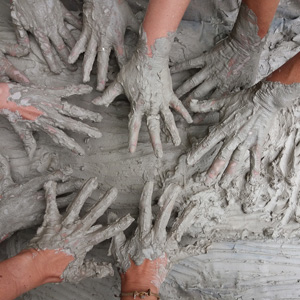Off the iPad and into the mud
© Caroline Witten-Hannah for Auckland Therapy Blog, 23 March 2018.
 Too much screen time?
Too much screen time?
Many kids are having far too much screen and device time. This means they miss out on other things like playing, talking to people, social interactions, homework, and outdoors to name a few.
What are the alternatives?
I have chosen to focus on unstructured play as this is an incredibly valuable activity for children which is often minimised and underrated.
- Unstructured play is the way children make sense of the world. It gives children opportunities to be in control of what is happening. They can act out their experiences and thus make sense of them.
- Through play children can express their feelings and work out their confusions.
- Children who are playing are being active and have the freedom to be unstructured which means they tend to exercise their creativity and imaginations.
- Play gives children the opportunity for children to try out their ideas and to problem solve.
- When children play with others they have opportunities to co-operate, take turns, share, discuss, negotiate and socialise.
These things don’t happen when children are on screens.
So what about playing in the mud?
In my therapeutic work with children I offer clay as a creative medium. Without fail children’s faces light up when a lump of clay is offered for them to use as they wish. I observe children expressing their emotions, especially anger, and then relaxing and calming down when they play with clay. Without fail they love it.
This prompted me to research the benefits of playing in mud, and messy play in general. Slime is the current fad among our youngsters. But mud is what nature provides for our children so why not use it. Also mud is free: Mud pies, dams, creative constuctions, mud sculptures and generally having a squelchy time.
The value of outdoor play
Playing outdoors in the mud is more than just having fun:
- It helps children build a connection to nature and the earth.
- It builds long-lasting childhood memories because it is such a rich experience that engages all the senses.
- Mud play stimulates creativity and imaginative play.
- Children visibly calm down and relax when playing with mud.
- New research has shown that exposure to friendly soil bacteria stimulates the immune system and causes the brain to release serotonin which is the endorphin that regulates moods and makes people feel happier.
- Mud play improves children’s brain activity and their learning because all their senses are engaged which results in a highly stimulated and active brain.
- Playing in the mud with other children is a wonderful social experience. Children are observed to communicate, cooperate, and negotiate. It puts them in a good mood and they love the freedom and unstructured nature of the play.
- Adults can have a great time playing in the mud with their kids. Why not all have fun together - it helps builds strong connections with your child based around creativity, nature and having fun.
Balanced activity
To summarise unstructured play is intrinsically a natural part of children’s everyday lives. It is vital that play is not squeezed out of their daily activities. This means screen time needs to be balanced with play time and active outdoor activities. If your children learn to achieve a healthy balance when they are young then they are more likely to continue to be balanced in use of screens as teenagers and adults.
